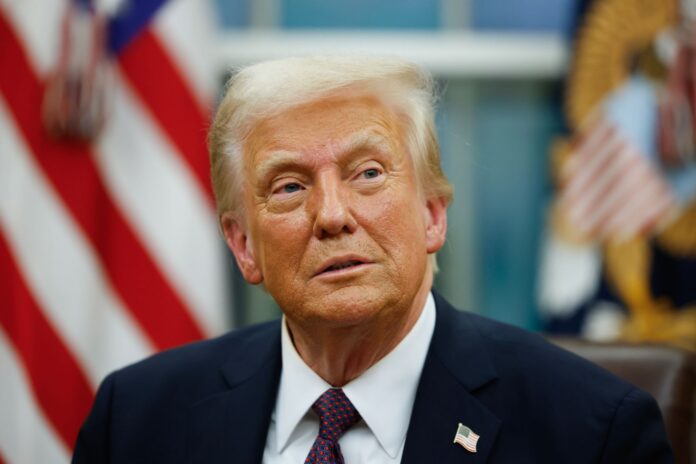The President of the United States, Donald Trump, has announced that the US will not participate in the upcoming G20 summit scheduled to take place in South Africa later this month.
Trump said the decision was taken in protest against what he called “genocide against Afrikaners” — white farmers of Dutch, French, and German descent — who he claimed are being killed and forced off their land.
In a post on Truth Social on Friday, Trump described the planned G20 meeting in Johannesburg as “a total disgrace”, accusing South Africa’s government of turning a blind eye to violence against white citizens.
“Afrikaners are being killed and slaughtered, and their land and farms are being illegally confiscated,” Trump wrote. “No US government official will attend as long as these human rights abuses continue.”
He added that he looks forward to hosting the 2026 G20 Summit in Miami, Florida, further confirming that the United States has withdrawn from this year’s gathering.
The Group of 20 (G20) is an international forum that brings together the world’s largest economies to discuss global economic cooperation, development, and stability. The 2025 summit is scheduled for November 22–23 in Johannesburg, South Africa, marking the first time the country is hosting the meeting.
In May 2025, the White House directed all federal agencies to cease preparations and coordination related to the summit, signaling early that the US would not attend. Trump had at the time hinted at the possibility of skipping the meeting due to alleged human rights violations in South Africa.
“We’re supposed to have a G20 meeting there … I don’t know how we can go unless that situation is taken care of,” he said earlier this year. “But it’s a genocide that’s taking place that you people don’t want to write about. It’s a terrible thing that’s taking place, and farmers are being killed. They happen to be white.”
Trump has repeatedly spoken about what he describes as targeted attacks on white farmers in South Africa, a narrative that has been widely debated both in South Africa and abroad.
In February, the US president signed an executive order freezing American foreign assistance to South Africa. The order claimed that the South African government’s land reform policies were “fueling disproportionate violence against racially disfavored landowners.”
The decision came days after Secretary of State Marco Rubio announced that he would also not attend the G20 summit, citing concerns about “ongoing violence and government-supported discrimination.”
Trump’s latest comments have reignited the controversy surrounding land ownership and racial tensions in South Africa — an issue that has deep historical roots.
Land ownership in South Africa has long been one of the country’s most sensitive issues. Under apartheid rule (1948–1994), the white minority controlled most of the country’s land, while the black majority was forcibly removed from ancestral areas.
Since the end of apartheid, the South African government has introduced land reform programmes aimed at redistributing land to address historical injustices. However, these policies have faced criticism from both ends — with some saying they are too slow and others claiming they unfairly target white farmers.
In recent years, isolated cases of violent attacks on farmers have gained attention in international media, though experts argue that these incidents are part of South Africa’s wider crime problem rather than evidence of organized ethnic targeting.
The South African government has consistently rejected claims of “white genocide,” calling them misleading and politically motivated. Officials say the country’s land reform efforts are designed to promote equality, not discrimination.
Trump’s statement has sparked mixed reactions across the international community.
Human rights groups in the United States and Europe have urged caution, saying that while violence in South Africa is a concern, there is no verified evidence of a genocide against white farmers.
The South African government has yet to issue an official response to Trump’s latest remarks, but in past instances, officials have accused the US leader of misrepresenting facts to score political points.
By skipping the meeting, the US may lose a key opportunity to engage with African leaders on economic cooperation, trade, and global development issues.
In his Truth Social post, Trump confirmed that the 2026 G20 summit will be hosted in Miami, Florida, marking the first time the event will take place in the US since 2008.
He said the Miami meeting would be “a celebration of freedom, fairness, and human rights,” a comment some observers saw as a jab at South Africa’s government.
Trump’s administration has maintained a tough stance on foreign aid, frequently tying it to human rights conditions and economic performance. His approach has won support from some conservative groups in the US but has also drawn criticism from international partners who see it as unilateral and divisive.
The boycott also comes at a time when the US is seeking to expand its influence in Africa to counter China and Russia’s growing presence on the continent.
By withdrawing from the Johannesburg summit, the US may be seen as disengaging from Africa’s multilateral platforms, potentially giving rivals more room to strengthen their partnerships across the region.

